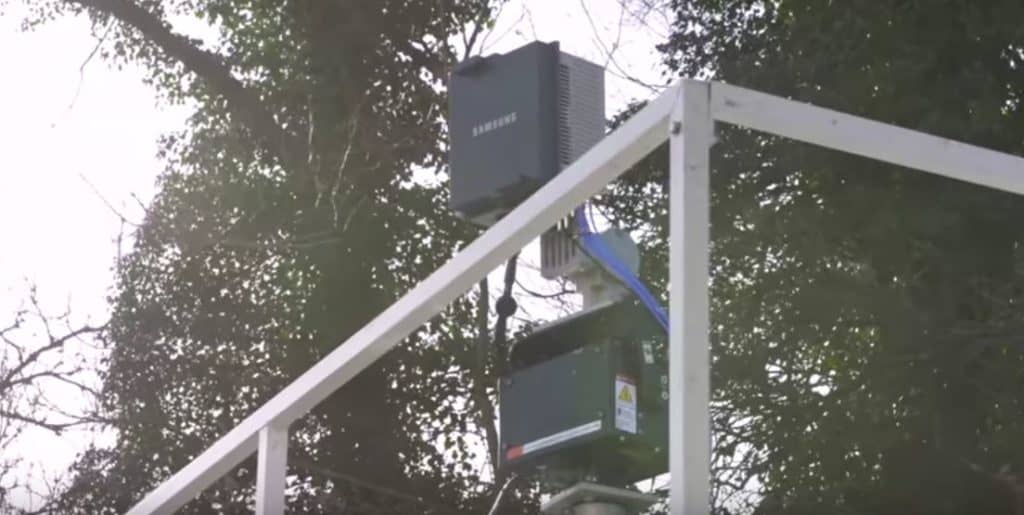 Samsung is testing super fast 5G with Verizon Wireless in the United States and with SK Telecom in Korea. SK Telecom and Samsung Electronics have successfully completed the world’s first 4G LTE and 5G end-to-end network interworking trial in a real outdoor environment in Seoul. This followed of the first multi-vendor end-to-end 5G trial network in the field, which took place in Ann Arbor, a suburb of metropolitan Detroit, Michigan. Verizon is testing 5G in various parts of the U.S. 5G is important because it may provide the bigger, faster, low-latency pipelines for the huge connected car data streams needed for autonomous vehicles.
Samsung is testing super fast 5G with Verizon Wireless in the United States and with SK Telecom in Korea. SK Telecom and Samsung Electronics have successfully completed the world’s first 4G LTE and 5G end-to-end network interworking trial in a real outdoor environment in Seoul. This followed of the first multi-vendor end-to-end 5G trial network in the field, which took place in Ann Arbor, a suburb of metropolitan Detroit, Michigan. Verizon is testing 5G in various parts of the U.S. 5G is important because it may provide the bigger, faster, low-latency pipelines for the huge connected car data streams needed for autonomous vehicles.
To enable interworking between 4G and 5G, the companies used the current 4G LTE commercial network in the 2.6GHz band and newly built 5G networks using frequencies of 3.5GHz and 28GHz, as well as virtualized core and a test device that supports both 4G and 5G technologies.
In the Eulji-ro area of South Korea where the SK Telecom headquarters is located, 360 degree virtual reality video was streamed live between a user in a traveling car and another in their headquarters’ building. The significant radio frequency (RF) challenge that the two companies faced for this trial was with the dense urban outdoor environment consisting of closely situated office buildings and busy traffic in Eulji-ro.
The successful trial showed that users can experience seamless uninterrupted streaming service when transitioning from 4G to 5G networks and vice versa. Furthermore this test also implies a potential 5G deployment scenario, where end users still will be able to enjoy seamless mobile service going to and from 4G and 5G service areas during the initial phases of 5G network deployment where full coverage areas have not been fully built out.
This trial served as a means to test and verify that seamless service is assured while a device moves to and from 4G LTE and 5G’s 3.5GHz and 28GHz networks. SK Telecom and Samsung established a virtualization network consisting of virtual 4G LTE and 5G cores with Software Defined Network (SDN) technology. Another critical element of the trial was to design in and test network slicing technology. The network slicing technology which can be used by network operators to offer different services and service levels was also evaluated to ensure consistent quality across diverse services in the multi-Radio Access Technology (Multi-RAT) setting.
5G Testing in USA
With the achievements and lessons learned from the test, SK Telecom and Samsung will continue with various tests and trials to come up with ideal commercial scenarios and further identify 5G use cases by maximizing the use of the existing 4G commercialized networks.
In May, Samsung Electronics America, Inc. and Cisco, in partnership with Verizon, announced the successful deployment of the first multi-vendor end-to-end 5G trial network in the field, which took place in Ann Arbor, a suburb of metropolitan Detroit, Michigan.
Earlier this year, Verizon announced plans for customer trials of 5G technology for home broadband service (Fixed Wireless Access). Five U.S. cities are scheduled to begin trials in the second quarter of 2017, with pilot trials in a total of 11 markets expected by the middle of the year. Verizon 5G is offered to pilot customers also in, Atlanta, Bernardsville (NJ), Brockton (MA), D
Da
The solution includes a 5G virtualized packet core as part of the Cisco Ultra Services Platform with Cisco Advanced Services and Samsung virtual RAN solutions (vRAN), paired with Samsung’s 5G Radio base stations and 5G home routers that will deliver broadband services to Verizon’s trial customers.
Early ecosystem development has become a core focus for 5G, with IT and telecom pioneers alike working to build alignment and stability around next-generation R &D. Verizon’s 5G Technical Forum, to which Cisco and Samsung are strong contributors, has set out to establish early direction for commercial 5G technologies and services, with the goal of establishing a body of experience that is already being used to inform global 5G standards development efforts and ensure a smooth transition to commercialization.
Verizon’s network legacy is rooted in being the first to deliver to customers next-generation wireless technology, coast to coast, before any other carrier. With 5G, Verizon is once again poised to usher in a new era of network technology, setting the pace for both 5G technical development and its emerging eco-system. The Verizon 5GTF delivered an open specification for 5G fixed wireless that is immediately implementable.
“5G technology innovation is rapidly evolving,” said Adam Koeppe, Vice President, Network Planning at Verizon. “Network density is increasing to meet the demands of customers, and following the FCC’s aggressive action on 5G spectrum, the time is right to deliver the next generation of broadband services with 5G.”